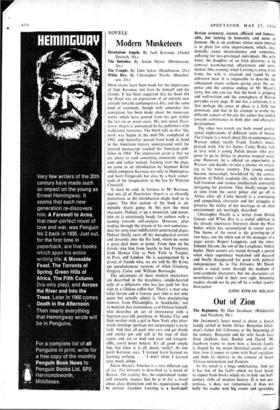NOVELS
Modern Musketeers
Desolation Angels. By Jack Kerouac. (Andre Deutsch, 30s.)
HIGH claims have been made for the importance of Jack Kerouac, not least by himself and his friends. It has been suggested that his book On the Road was an expression of an entirely new attitude towards contemporary life, and the same kind of statement, though with somewhat less conviction, has been made about the numerous works which have poured from his pen within the last six or seven years. His new novel Deso- lation Angels is announced by his publishers with traditional reverence. The blurb tells us that 'this work was begun in the mid-'50s, completed in 1961, and thereafter passed from hand to hand in the American literary underground until the tattered manuscript reached the American pub- lisher in 1964.' The impression given is that we are about to read something immensely signifi- cant and rather wicked. Turning over the page, we come to an introduction by Seymour Krim which compares Kerotiac not only to Hemingway and Scott Fitzgerald, but also, by a back somer- sault of the imagination, to the late Sir Winston Churchill.
It must be said, in fairness to Mr Kerouac, that not all of Desolation Angels is as absurdly pretentious as the introduction might lead us to expect. The first section of the book is ad- mittedly heavy going. In this part the main character, Duluoz, is up a mountain, and moun- tain air is notoriously heady for authors with a leaning towards self-analysis. However, after wading through the stream of his own conscious- ness for sixty-four indifferently-punctuated pages, Duluoz finally casts off his metaphysical corsets and descends into the flat land, where he seems a great deal more at home. From then on his travels take him from Seattle to San Francisco, from Mexico City to New York to Tangier, to Paris and London. He is accompanied by a group of friends who, we are told by Mr Krim, are pseudonymous versions of Allen Ginsberg, Gregory Corso and William Burroughs.
The adventures of these modern musketeers are described in the breathless, simple-hearted style of a debutante who has just paid her first visit to a Chelsea coffee bar. There's a man who takes heroin and a famous poet who is not only queer but actually admits it, 'thus precipitating tremors from Philadelphia to Stockholm,' not to mention that tremendous card Duluoz himself, who describes an act of intercourse with a fourteen-year-old prostitute in Mexico City and theti another with a girl in New York who after- wards develops (perhaps not surprisingly) a nasty rash. And they all pack into cars and get drunk and smoke pot and yell at the tops of their voices and are so mad and cool and irrespon- sible, you'd never believe. It's all good simple fun, but what is it all about, really? At one point Kerouac says, 'I learned learn learned no learning nothing. . .' I don't think I learned very much either.
Anton Myrer's America is a very different cup of tea. The Intruder is described as 'a novel of Boston.' On reading this, the experienced reader will instantly suspect that he is in for a novel about class distinction and his expectations will be correct. Gardner Lawring is a hard-shell Boston aristocrat, austere, efficient and honour- able, but lacking in humanity and sense of humour. He is an architect whose main interest is in plans for civic improvement, which, inci- dentally, cause inconvenience and sometimes suffering for less-privileged individuals. His wife Janet, the daughter of an Irish plasterer, is by contrast warm-hearted, affectionate and senti- mental. One evening, when Lawring is away from home, his wife is attacked and raped by an unknown man. It is impossible to describe the subsequent events without giving away the sus- pense and the surprise ending of Mr Myrer's story, but one can say that the book is gripping and well-written and the atmosphere of Boston pervades every page. If one has a criticism, it is that perhaps the sense of place is a little too dominant, and that in his attempt to evoke the different aspects of the city .the author has tended towards contrivance in both plot and character development.
The other two novels are both sound profes- sional explorations of different veins of fiction. The Couple is a novel about life in contemporary Warsaw which recalls Frank Tuohy's much- praised work The Ice Saints. Cathy Birley falls in love with a young Polish doctor who pro- poses to go to Africa to practise tropical medi- cine. However, he is offered an opportunity in Warsaw and decides to take a chance on return- ing to his native country. The young couple become increasingly bewildered by the contra- dictions of Polish academic life, with its uneasy half-freedom and restless intellectuals constantly intriguing for position. They finally escape just in time from the secret police and go off to Africa after all. Cathy herself is a convincing and sympathetic character and her struggles to preserve the reality of her marriage in an alien environment are movingly described.
Christopher Nicole is a writer from British Guiana and White Boy is a useful addition to the already impressive literature about the West Indies which has accumulated in recent years. The theme of the novel is the growing-up of two boys, one the white son of the manager of a sugar estate, Rupert Longdene, and the other, Johnnie Sikram, the son of the Longdenes' Indian butler. Their careers are traced through a period when white supremacy weakened and decayed and finally disappeared for good with political independence. As in The Intruder, Mr Nicole paints a social scene through the medium of semi-symbolic characters, but the characters are nevertheless valid in their own right. Intending readers should not be put off by a rather tawdry dust-jacket.
JOHN ROWAN WILSON


































 Previous page
Previous page